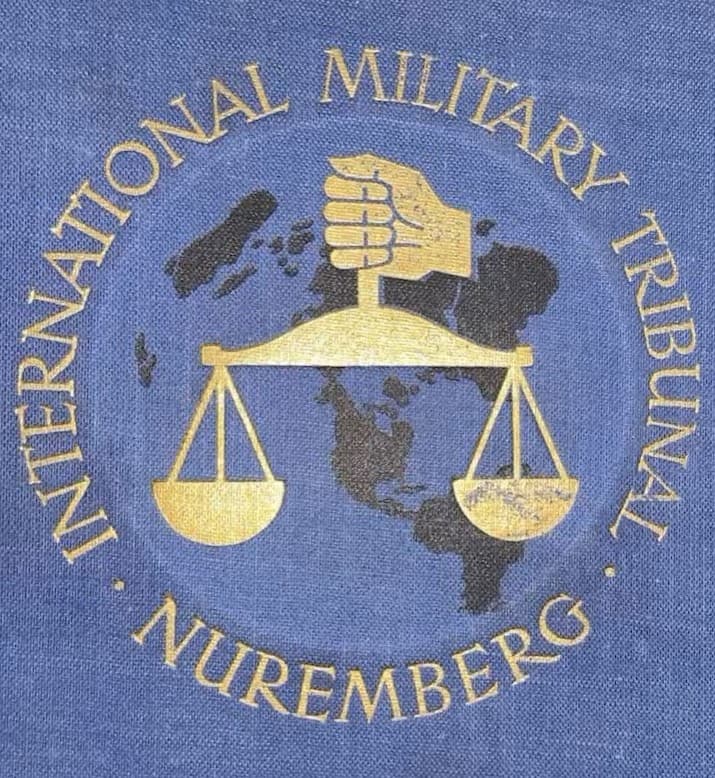The Evening Star (April 25, 1946)
Fritsch and Blomberg framed by Goering in 1938, court is told
Details of Nazi shakeup in German Army given by former Gestapo officer
NUERNBERG (AP) – A former German secret police official declared today that Hermann Goering engineered frameups in 1938 which resulted in the dismissal of both the Reich war minister and the army’s chief of staff – “the decisive last steps before the outbreak of war.”
Hans Bernd Gisevius, one-time Gestapo officer, testified before the International Military Tribunal that Goering had compelled a common criminal to identify Col. Gen. Werner von Fritsch, the army’s chief of staff, as the perpetrator of an atrocious homosexual attack.
The dramatic denunciation of Von Fritsch, whom the German moderates had regarded as the man to overthrow the Nazis, was made in Adolf Hitler’s presence, the tall, bespectacled witness asserted, nine days after Goering’s own agents had established that the actual culprit in the case was one Capt. von Frisch.
Hitler given files on bride
Gisevius, who testified yesterday that he plotted against the Nazis for 10 years while serving in various police jobs, declared that Goering knew in advance that elderly Field Marshal Werner von Blomberg, the war minister, had fallen in love with a 28-year-old carpenter’s daughter, but withheld the information until after the Fuehrer had been induced to attend the wedding.
After the wedding, Gisevius said, Goering gave Hitler police files showing that Von Blomberg’s bride “had been a prostitute registered in seven large German cities; she was in the Berlin rogue’s gallery for I myself have seen the pictures and fingerprints, and she had been punished for distributing pornographic pictures.”
On scanning the files, the witness continued, Hitler “suffered a nervous breakdown and decided to dismiss Von Blomberg immediately.” Gisevius said the Berlin Police Court president, Count Graf Helldorf, was reluctant to turn over the files on the woman to Heinrich Himmler, because he realized “it would put the armed forces in an impossible position and Himmler could use it to finish off Blomberg.”
Keitel tried to hush scandal
Helldorf first took the files to Field Marshal Wilhelm Keitel, who succeeded Von Blomberg and who was remotely related to him, and Keitel insisted that he “cover up the entire scandal,” Gisevius declared. Then, he went on. Keitel asked that the files be sent to Goering.
Goering heard the testimony with his face drawn in hard, grim lines. Keitel smiled and slightly shook his head in the negative when his name was mentioned.
Gisevius said Hitler first intended to name Von Fritsch as Von Blomberg’s successor in the War Ministry, “but Goering and Himmler reminded him that was impossible because Von Fritsch was badly incriminated” in the homosexuality charges.
He testified that Hitler was indignant in 1935 when shown Gestapo files purporting to link Von Fritsch with the homosexuality charges, and ordered the files burned. Nevertheless, the witness continued, Goering and Himmler held on to them and in 1938 Goering offered to produce a prison inmate who three years before had told the Gestapo of offenses by a man named Fritsch or Frisch.
Threatened to kill convict
He declared that Goering first took this convict to Karinhall, Goering’s home, and “threatened to have him killed unless he repeated the statement before Hitler.”
“Von Fritsch was asked to the reichschancellery on January 24, 1938, and told by Hitler of the accusations,” Gisevius said. “He indignantly denied them. Then in a dramatic moment, Goering opened the door and the prisoner came into the room and pointed at Von Fritsch and said: ‘That is he.’”
Gisevius said the Gestapo knew as early as January 15 that year that Von Fritsch really was innocent.
He said Hjalmar Schacht, one of the defendants here, and other “decent Germans’’ believed the time for the overthrow of the Nazis had arrived when Hitler appointed Col. Gen. Walter von Brauchitsch to succeed Von Fritsch.
A group of plotters, the witness testified, went to the new chief of staff and to Grand Adm. Erich Raeder and others urging that “now was the time for the generals to get rid of this reign of terror.” He said Von Brauchitsch agreed, but decided against acting until a German war court had exonerated Von Fritsch and thus weakened Hitler’s hold on the people.
Court met and adjourned
Goering had been appointed president of that court. It met, then adjourned.
“That was the day the decision was made to have the Germans march into Austria,” Gisevius declared. “We harbored no doubt as to why the president of the court was interested in seeing that the troops got orders to march that day.
“A week later the court could meet again, but by then Hitler had his first big triumph and Germans had their first campaign of flowers.
“The court was dissolved. Von Fritsch’s innocence was proclaimed, but Von Brauchitsch said that under the new situation created by the annexation of Austria he could no longer take responsibility to proceed with the putsch.
“That is the story of how the War Ministry was deprived of its leading men and then the generals were thrown into confusion and from that time on passed into radicalism,” Gisevius concluded.
















